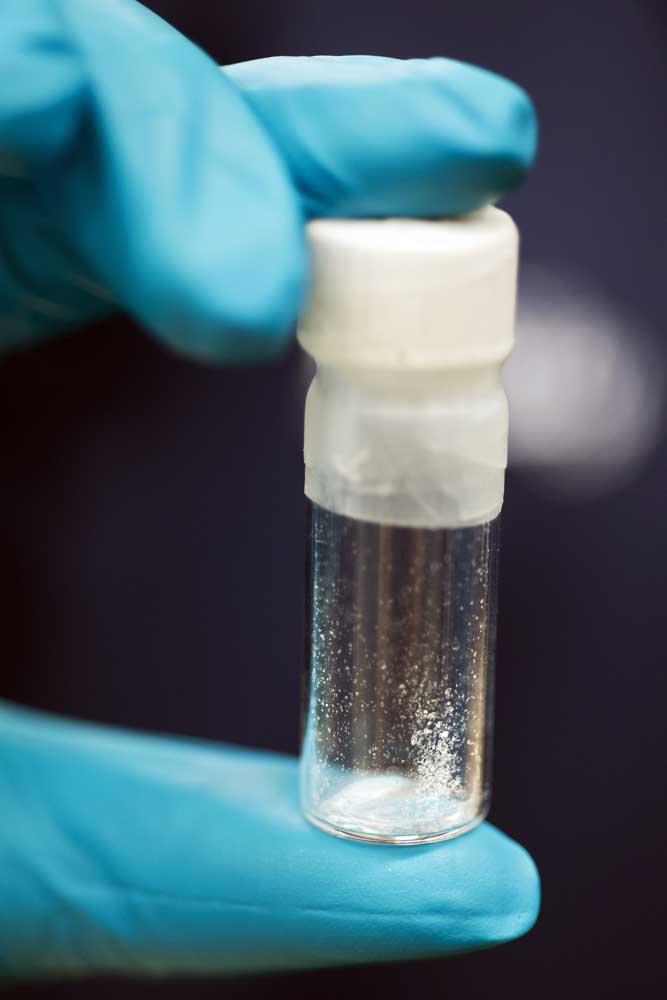Four die from fentanyl overdoses in the first week of the year, continuing worsening trend
Published 5:30 am Tuesday, January 16, 2024

- A vial containing 2 milligrams of fentanyl is displayed at the Drug Enforcement Administration research Laboratory in Sterling, Virginia, in 2016.
Four people, ranging in age from early 20s to 50s, died from fentanyl overdoses in Deschutes County in the first week of the year, health officials say.
That’s almost double the typical monthly average for overdose deaths in Deschutes County, which, to some, is an indication of a continuing trend of rising overdose deaths. Currently, the culprit is fentanyl.
Trending
Before the four deaths, which occurred between Jan. 2 and Jan. 8, the average number of deaths had been between two and three per month, said Ana Woodburn, the overdose prevention and response coordinator for Deschutes County Health Services.
“We are seeing an increase in access to fentanyl in powder form versus pill form in the market, which often changes,” Woodburn wrote in an email, “and it seems possible that people are overdosing more easily on powder form.”
This time last year, there were four overdoses for the entire month of January, “so we determined that four suspected overdose fatalities in the first eight days of the year is an increase,” Woodburn said.
Drug overdose deaths are soaring in Central Oregon, and fentanyl is largely to blame
Trending
Mathew Christensen, the county’s epidemiologist, said drug overdose deaths doubled in Oregon between 2019 and 2021, and rates have continued to rise since then, according to provisional data.
“This is not a communicable disease,” Christensen told The Bulletin in December. “Nonetheless, it is spreading through our community.”
However, in Deschutes County, there has been a steady increase over the past five years, but it’s had one of the lowest rates of overdose deaths in the state, he said. It’s uncertain how long that will last.
As many struggle to understand the problem of rapidly increasing overdose deaths, local officials are able to prepare because of what’s happened in other counties across the state, Christensen said.
Deschutes County’s comparatively low rate can be explained a number of ways. Christensen speculates geographic separation from hotspots like Multnomah County and Lane County, active law enforcement partnerships in Central Oregon and well-developed systems of Narcan distribution could be major factors.
Narcan is the brand name for the overdose reversal drug naloxone.
“Narcan is an emergency response,” Christensen said. “Narcan is very effective in that crisis moment. Narcan is not a long-term strategy to get into recovery and get back on your feet.”
Deschutes County’s harm reduction program distributed more than 2,000 naloxone kits in 2023 to residents, service providers and agencies, which was more than double the number of kits distributed last year. Each kit contains two doses, which amounts to more than 4,000 doses of the life-saving drug.
To Leslie Corless, the program’s coordinator, that means people are saving each other’s lives on a regular basis.
Deschutes County’s harm reduction program recommends the following steps and strategies for community members:
• Assume any substance purchased on the street or purchased online may contain unknown substances.
• Limit using multiple substances at the same time.
• Never use alone, but if you do, call or text a friend or call the Never Use Alone hotline at 877-696-1996.
• Know your tolerance or go slowly, especially if you haven’t used for a few days.
• Make sure everyone in the area can access naloxone (aka Narcan) and knows how to administer it.
• Naloxone is safe. Even if naloxone is given to someone who is not experiencing an overdose, it will not harm them.
“Really, essentially, what it says to me is that people care about each other,” Corless said. “They care about living. They care about survival.”
The county’s harm reduction program has existed in some form for roughly 15 years. In addition to naloxone kits, the program offers fentanyl testing strips, free testing for HIV, syphilis and hepatitis C, syringe exchange and additional supplies, a variety of free vaccinations and referrals to substance use treatment.
The goal is overdose prevention and response through building trustworthy relationships in the community.
“Essentially what we do is offer opportunities for connection and community with no judgment or stigma,” Corless said.
Decades of research have shown harm reduction to be an effective way to address health and safety issues associated with drug use, according to the U.S. Department of Health and Human Services‘ National Institute on Drug Abuse.
The adage that harm reduction enables drug use simply isn’t true, Corless said. She added, harm reduction didn’t create the circumstances under which someone uses substances.
“Drugs don’t need our help. Drugs do just fine without our help,” Corless said. “What we do is enable people to have the best choices available to them to be healthy.”
If you or someone you care about is struggling with drug or alcohol use, here are resources that can help:
• Crisis services are available in Deschutes County through the Suicide and Crisis lifeline, which can be reached via call or text at 988, or 541-322-7500 ext. 9. People can also walk into the Stabilization Center at 63311 NE Jamison St. in Bend, which is open 24 hours a day, seven days a week.
• Substance Abuse and Mental Health Services Administration national helpline: 1-800-662-4357.
• Find treatment near you at findtreatment.gov.
• Lines for Life, the drug and alcohol helpline, is for individuals and family members seeking crisis intervention, treatment referral, and chemical-dependency information. Call 800-923-4357 or text “Recovery Now” to 839863.
• A teen-to-teen crisis and helpline for youth and teens is available from 4-10 p.m. on weekdays via phone at 877-968-8491 or via text at ‘teen2teen’ to 839863.
• For information about opioids, fentanyl and response, visit Deschutes County Health Services website www.deschutes.org/stopoverdose.








